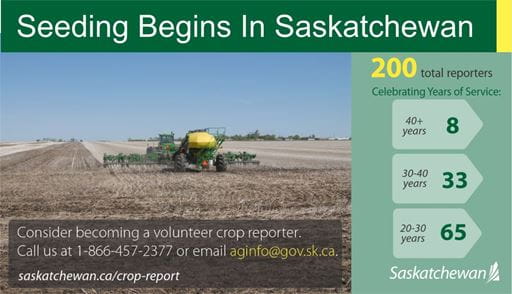Released on May 11, 2023
Seeding is underway in Saskatchewan, with nine per cent of the crop in the ground, according to the first Crop Report of the season.
“Saskatchewan is a global leader in agricultural trade because of the abundance of high-quality, sustainably-produced crops grown in our province,” Saskatchewan Agriculture Minister David Marit said. “As producers undertake the significant investment of spring seeding, we encourage them to be aware of their surroundings, be farm safe and ask everyone to be mindful of the farm equipment on roadways during this busy season.”
Saskatchewan is home to more than 40 per cent of Canada’s cultivated farmland, producing nearly 35 million tonnes of total crop production in 2022.
Seeding was delayed in the month of April due to cool weather and spring snowstorms. Fields had to warm up and dry out before work could begin. The provincial seeding progress of nine per cent is behind the five-year average (2018-2022) of 23 per cent. Seeding is furthest advanced in the southwest, west-central and northwest regions. Seeding progress is slower in the eastern regions where snowfall was heavier and water in fields is taking longer to disappear.
The northwest leads with seeding progress at 17 per cent, while the west central and southwest are at 14 and 13 per cent respectively. The northeast has seven per cent seeding complete, which is ahead of normal for this time of year. The southeast and east central regions have wetter fields than the rest of the province and both sit at three per cent seeded.

The most rainfall over the past week was recorded in the Marengo area with 35 mm. The Rockglen area received 10 mm and the Webb and Hazenmore areas received seven mm, and many more areas of the province received between one to five mm of rain over the week. Producers in the southwest and west central regions are already raising concerns about how dry their fields are and are hoping for a good soaking rain once the majority of seeding is finished.
Topsoil moisture for cropland is rated as five per cent surplus, 72 per cent adequate, 21 per cent short and two per cent very short. Hay and pasture land is rated as two per cent surplus, 66 per cent adequate, 28 per cent short and four per cent very short. While these conditions show improvement over last fall, producers are hoping for more rain in June and July.
The winter snowfall was rated as 34 per cent above normal, 48 per cent normal and 18 per cent below normal. Livestock producers in areas that did not receive adequate snowfall are anticipating minor to moderate water shortages over the next two months if they do not receive a significant rainfall.
Snowmelt runoff improved this spring compared to previous years with 21 per cent of crop reporters receiving above normal, 57 per cent normal and 22 per cent below normal levels of runoff. Of these reporters, 75 per cent reported that the amount of runoff received would fill dugouts and water bodies in their area which is reassuring news for livestock producers who have had two difficult years with water quality and quantity.
Calving is coming to an end and livestock producers will soon begin assessing their pastures and moving cattle out when they can. Producers who are running low on feed for their livestock have already started moving some of their herd to pasture to help reduce feed consumption. The cool weather throughout April was good for moisture retention but it did not allow pastures to rapidly regrow. Warm weather and some light rains would be appreciated by many livestock producers to ensure cattle have adequate feed while on pasture.
Producers are currently harrowing, rock picking and rolling. When the weather allows, farmers are spraying and seeding. Producers are reminded to be safe during their field activities and when transporting equipment across or alongside roadways. When working in extremely dry areas, especially pastures, ensure sparks or any other fire risk is limited and a water source is available.
More than 200 farmers, ranchers, agrologists and other volunteers fill out a weekly survey during the growing season to contribute information that forms the crop report. We are actively seeking additional volunteers. For more information about becoming a volunteer crop report, contact the Agriculture Knowledge Centre at 1-866-457-8377.
A complete, printable version of the Crop Report is available online at www.saskatchewan.ca/crop-report. Follow the 2023 Crop Report on Twitter at @SKAgriculture.
-30-
For more information, contact:
Jamie Shanks
Agriculture
Regina
Phone: 306-787-5155
Email: jamie.shanks2@gov.sk.ca
